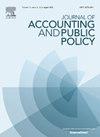Key audit matters as insights into auditors’ professional judgement: Evidence from the European Union
IF 2.2
3区 管理学
Q1 BUSINESS, FINANCE
引用次数: 0
Abstract
The European Union (EU) Regulation 537/2014 introduced the mandatory disclosure of Key Audit Matters (KAMs) within an auditor’s report, with the aim of increasing the informational value of these reports. Extant research, however, shows contrasting results as to whether KAM disclosure is providing relevant information to stakeholders. Moreover, concerns have been raised about unintended consequences from KAM disclosure, with respect to the process that leads to the issuance of the audit report. Using a sample of 6,164 firm-year observations for the period 2017–2021, related to 1,660 unique firms listed in all EU Member States, we find that the number of KAMs is positively associated with audit fees, audit report lags and the probability that an opinion different from the standard unqualified opinion is issued. Moreover, we document that both KAMs related to entity-level and account-level risks are positively associated with audit fees, whereas only entity-level KAMs drive the positive association with audit report lags and the issuance of a modified opinion. Our research speaks directly to EU legislators, the International Auditing and Assurance Standards Board, the US Public Company Accounting Oversight Board, and any other regulators around the globe that have mandated the disclosure of KAMs within audit reports.
关键审计事项对审计师职业判断的洞察:来自欧盟的证据
欧盟(EU)法规537/2014引入了在审计报告中强制披露关键审计事项(KAMs)的规定,目的是增加这些报告的信息价值。然而,现有的研究在KAM披露是否向利益相关者提供相关信息方面显示出截然不同的结果。此外,人们还对KAM披露对导致发布审计报告的过程产生的意外后果表示关切。使用2017-2021年期间的6164家公司年度观察样本,与所有欧盟成员国上市的1660家公司相关,我们发现kam的数量与审计费用、审计报告滞后以及与标准不合格意见不同的意见发布的可能性呈正相关。此外,我们证明,与实体级和账户级风险相关的KAMs都与审计费用呈正相关,而只有实体级KAMs与审计报告滞后和修改意见的发布呈正相关。我们的研究直接向欧盟立法机构、国际审计与鉴证准则委员会(International Auditing and Assurance Standards Board)、美国上市公司会计监督委员会(Public Company Accounting Oversight Board),以及全球任何其他要求在审计报告中披露kamm的监管机构发表意见。
本文章由计算机程序翻译,如有差异,请以英文原文为准。
求助全文
约1分钟内获得全文
求助全文
来源期刊

Journal of Accounting and Public Policy
Multiple-
CiteScore
4.80
自引率
2.80%
发文量
75
期刊介绍:
The Journal of Accounting and Public Policy publishes research papers focusing on the intersection between accounting and public policy. Preference is given to papers illuminating through theoretical or empirical analysis, the effects of accounting on public policy and vice-versa. Subjects treated in this journal include the interface of accounting with economics, political science, sociology, or law. The Journal includes a section entitled Accounting Letters. This section publishes short research articles that should not exceed approximately 3,000 words. The objective of this section is to facilitate the rapid dissemination of important accounting research. Accordingly, articles submitted to this section will be reviewed within fours weeks of receipt, revisions will be limited to one, and publication will occur within four months of acceptance.
 求助内容:
求助内容: 应助结果提醒方式:
应助结果提醒方式:


